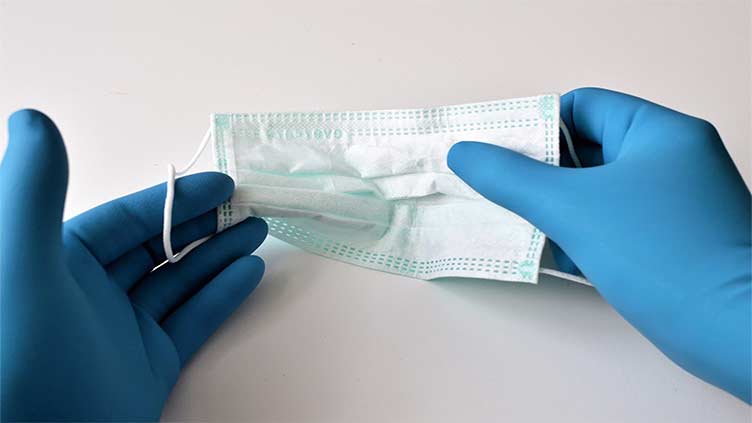Mask mandates in hospitals may have done little to slow Covid-19 Omicron transmission

Findings will be presented this month at the 2023 ECCMID in Copenhagen.
ISLAMABAD, (Online) - Data collected from one of the United Kingdom’s biggest hospitals during the Omicron wave of the Covid-19 pandemic suggests that masking mandates made no impact on the transmission of the virus.
Researchers from St. George’s Hospital in London analyzed ten months of data from the teaching hospital, spanning from December 2021 to September 2022. Despite the fact that mask mandates have been promoted as an inexpensive, accessible way to control the spread of Covid-19, the information gathered showed that masking made “no discernible difference” in reducing the rate of hospital-spread infections.
Their findings will be presented this month at the 2023 European Congress of Clinical Microbiology & Infectious Diseases (ECCMID) in Copenhagen. The full research has not yet been published in a peer-reviewed journal.
According to experts interviewed by Healthline, the findings are in line with other recently collected data — and underline the relationship between masking and quality of care.
Hospital-spread omicron infections not reduced
As noted in the press release, the study took part in two phases: one which required all hospital staff and visitors to wear masks, and a second in which only those in the highest-risk wards of the hospital were required to mask up.
While lifting a hospital mask policy at the height of the Omicron wave may seem like a risky move, the results showed that infection rates at the hospital were no higher after people stopped wearing masks — and these findings were underlined by the fact that there was no delayed surge of infections after the fact.
The data does come with the caveat that masking versus non-masking was not tested in the high risk areas of the hospital. It’s also worth noting that as an observational study, it can’t prove causation. Staff infection rates and adherence to the mask-wearing policy were not assessed.
Health experts weigh in
Jeanne Noble, associate professor of Emergency Medicine at the University of California, San Francisco (UCSF), also serves as the Director of Covid Response at UCSF’s Parnassus Emergency Department, told Healthline that the study’s methodology was more robust than many other observational trials.
“The bottom line is that lifting the hospital mask mandate did not lead to a measurable increase in hospital-acquired Covid infections,” she explained. “This study’s findings are consistent with the recent Cochrane metanalysis, summarizing the best available data to date on the impact of masks in allowing the transmission of respiratory viruses including Covid-19.”
Monica Gandhi, a professor of medicine and the associate division chief of the Division of HIV, Infectious Diseases, and Global Medicine at UCSF/ San Francisco General Hospital, pointed out that the findings are consistent with data collected by Cornell University during the Omicron surge. She added that masking up made sense in the early days of the pandemic, but data collected in the ensuing months has given us a better understanding of the interplay between masking and infection rates.
“In the spring of 2020, various restrictions and interventions made sense — even sometimes in the absence of rigorous science supporting them,” she told Healthline. “That was understandable at the time and included mask mandates. Indeed, I wrote one of the first papers calling for universal face masks for Covid-19. Our group has a hypothesis that face masks reduced the viral inoculum and led to less severe disease early on in the pandemic and that hypothesis had subsequent evidence behind it.”
How do masks impact the quality of care?
Hospitals are one area where masking can be incredibly important — particularly for doctors performing surgery, or for high risk patients who are at an increased risk of getting an infection.
While it may seem contradictory, hospitals are also an area where masking can hinder, rather than help, depending on the situation.
Noble told Healthline that masking can create a barrier when it comes to providing the best care possible for patients.
“Without question, masking reduces the quality of care we provide for our patients,” she said. “Masks reduce our ability to communicate with patients who are hard of hearing, which includes a large proportion of older patients.”
Another subset of patients for whom masking can create a communication issue is those who are delirious or have cognitive impairments because wearing a mask obscures their facial expressions, which hinders their ability to communicate.
“Masks limit communication when the patient is not fluent in the language spoken by their provider, and for all encounters, masks limit the expression and perception of emotions, including empathy, that are the cornerstone of the practice of medicine,” Noble continued.
Noble said that, unless robust data emerges which shows a significant benefit from hospital masking, persistent mask mandates can threaten or even violate a core ethical tenet of the medical profession, “First, do no harm.”
Gandhi points out that this data shouldn’t be misconstrued as an indicator that masks do not work, full stop.
“Basically, mask mandates by themselves don’t seem to work,” she said, adding, “Although that may seem counterintuitive, this is likely because people wear different kinds of masks and wear them in different ways, such as below the nose. Just because mask ‘mandates’ don’t work does not mean masks ‘don’t work’ at the individual level.”
She also emphasized that wearing medical-grade masks that have been properly fitted can provide substantial protection against airborne particles.
“At this point in the pandemic, I would recommend an N95, KF94, FFP2, or a double mask indoors to block respiratory pathogens, but I do not see how we can impose mask mandates on the public given the emerging data, including in healthcare settings,” Gandhi told Healthline.

